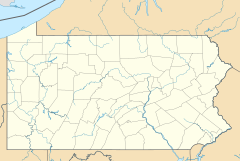James Garfield Memorial, Philadelphia
 | |
 Location in Philadelphia | |
| Coordinates | 39°58′26″N 75°11′26″W / 39.9739°N 75.1905°W |
|---|---|
| Designer | Sculptor: Augustus Saint-Gaudens Architect: Stanford White |
| Material | Sculpture: bronze Base: granite |
| Height | Bust: 3.6 ft (1.1 m)[1] Base: 17 ft (5.2 m)[2] |
| Beginning date | Commissioned: 1885 Cast: 1895 |
| Dedicated date | May 30, 1896 |
| Owner | City of Philadelphia Fairmount Park Commission |
The James Garfield Memorial is a monument honoring the 20th President of the United States in Philadelphia, Pennsylvania, United States. Sculptor Augustus Saint-Gaudens and architect Stanford White collaborated on the memorial, which was completed in 1896. It is located in Fairmount Park, along Kelly Drive, near the Girard Avenue Bridge.[3]
History[]
President Garfield was shot by an assassin in Washington, D.C. on July 2, 1881, and died of his wounds at the White House on September 19. Later that year, the Fairmount Park Art Association initiated a fundraising campaign to erect a monument to him in Philadelphia.[4] This was the second monument to be commissioned by the Association, which selected Augustus Saint-Gaudens in 1889 to design and create the work.[5]: 207
Cast in 1895, the monument was formally dedicated on May 30, 1896 by Mayor Charles F. Warwick.[2]: 12 The dedication ceremony included a grand river fete with parades and a flotilla along the Schuylkill River.[5]: 68
The monument is one of 51 sculptures included in the Association for Public Art's Museum Without Walls: AUDIO™ interpretive audio program for Philadelphia's outdoor sculpture.[6]
1896 Description[]
The Garfield Memorial.
Between the pilasters of granite is the figure of a woman in bronze, of heroic size—typical of America—young, strong, dignified, holding in her hand the sword and palm, symbolic of Garfield's life, and bearing his name on the shield which she holds in front of her. Surmounting four square granite pilasters is the BUST of Garfield, of heroic size.
Pedestal.
The main pedestal is four feet wide, three feet deep, and seventeen feet high, resting upon a base projecting to carry the emblematic figure.
The main pedestal is flanked by four square Ionic pilasters. The material is pink Milford granite, and the style of the pedestal is pure Greek.[2]: 23
Inscription[]
The inscriptions read:
- A. ST GAUDENS '95
- Cast by the Henry-Bonnard Bronze Co.,
- NY 1895
- A. ST GAUDENS '95
(Front of shield held by figure of the Republic:)
- E PLVRIBVS
- VNVM
- JAMES ABRAM
- GARFIELD
- PRESIDENT OF THE
- VNITED STATES
- MDCCC
- LXXXI
- E PLVRIBVS
(Base, above the Republic's head:)
- MDCCCXXXI
- MDCCCLXXXI
- MDCCCXXXI
(Base, below bust:)
- MDCCCXCB
The Fairmount Park Art Association plaque appears on the lower front of the sculpture's base. [1]
See also[]
References[]
| External audio | |
|---|---|
- ^ a b "Bust of James Garfield, (sculpture)". Inventories of American Painting and Sculpture, Smithsonian Institution Research Information System. Retrieved December 29, 2011.
- ^ a b c Unveiling of the memorial to General James A. Garfield, Fairmount Park, Philadelphia ... May 30th, 1896
- ^ Philadelphia Public Art
- ^ "James A. Garfield Monument", Museum Without Walls: AUDIO™, Interactive map accessed March 1, 2013.
- ^ a b Bach, Penny (1992). Public Art in Philadelphia. Philadelphia, PA: Temple University Press. ISBN 0-87722-822-1.
- ^ a b Garfield Monument (audio), Association for Public Art, Philadelphia, accessed March 1, 2013.
External links[]
- "James A. Garfield Monument", Museum Without Walls: AUDIO™, Interactive map accessed March 1, 2013.
- Monuments and memorials in Philadelphia
- Outdoor sculptures in Philadelphia
- 1895 sculptures
- Cultural depictions of James A. Garfield
- Bronze sculptures in Pennsylvania
- Fairmount Park
- Statues in Pennsylvania
- 1895 establishments in Pennsylvania
- Sculptures of men in Pennsylvania
- Sculptures of women in Pennsylvania
- Busts of presidents of the United States
- Allegorical sculptures in Pennsylvania
- Sculptures by Augustus Saint-Gaudens
- Stanford White buildings


